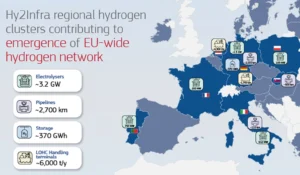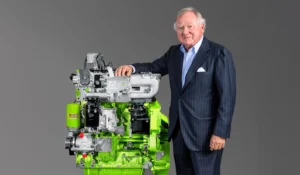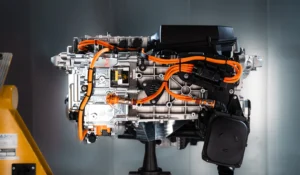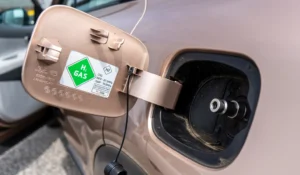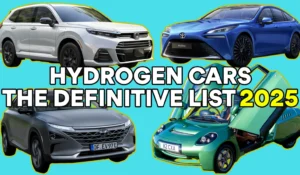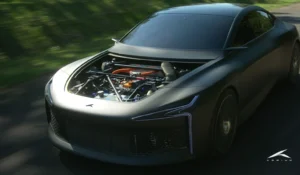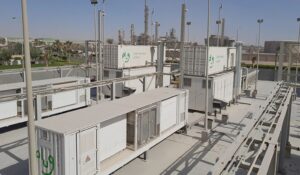Hydrogen vs. Electric Cars: Will hydrogen win the battle for the future of fuel?
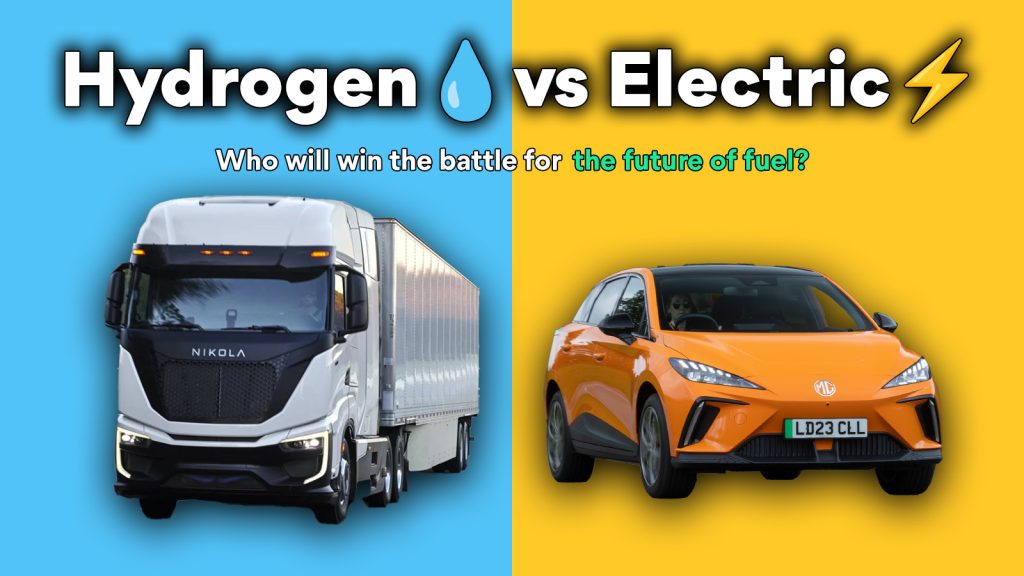
As the world moves away from fossil fuels, the race to dominate the future of energy intensifies. Two main contenders have emerged: hydrogen vs electric cars.
Each technology has unique advantages and challenges, making the competition to become the leading green fuel source complex and highly competitive.
But who will win the battle for the future of fuel? Driving Hydrogen Editor Matt Lister takes a look…
The Case for Hydrogen Fuel
Superior Energy Density
Let’s start with hydrogen. We’re not biased (cough), but hydrogen fuel cells offer distinct advantages over electric batteries, particularly in terms of energy density and refuelling times.
Hydrogen has a much higher energy-per-weight ratio. One kg of a lithium battery can store only 0.15-0.25 kWh of energy, whereas one kg of hydrogen stores 39.6 kWh of energy.
This means hydrogen cars can cover distances comparable to conventional petrol and diesel vehicles, making them ideal for long distances, goods transport, and heavy-duty applications.
Refuelling a hydrogen vehicle takes just minutes, similar to refuelling a conventional combustion engine car. This quick refuelling process is a game-changer, especially for industries that rely on rapid turnaround times, such as logistics, public transportation, and emergency services.
Versatility and Production
Hydrogen stands out in its versatility. It can be produced from various sources, including natural gas, biomass, and water electrolysis using renewable energy. This flexibility makes hydrogen attractive for countries with diverse energy landscapes.
As green hydrogen—produced using renewable energy—becomes more economically viable, it promises a truly sustainable fuel solution.
Hydrogen can also be stored and transported more easily compared to electricity. Innovations in compression and liquefaction techniques address major logistical challenges, enhancing energy security and reliability.
The molecule is just a more practical method of storage and transportation, in the real world, than the electron.
Environmental Benefits
Hydrogen fuel cells produce zero harmful emissions, with water being the only byproduct at the tailpipe. This makes hydrogen an environmentally friendly option, particularly when produced from renewable sources.
The ability to produce hydrogen locally from renewable energy also reduces the carbon footprint associated with transportation and distribution.
Safety and Sustainability
Hydrogen fuel cells are efficient and inherently safer than traditional combustion engines. Advances in fuel cell technology and hydrogen storage have significantly mitigated the risks associated with hydrogen’s flammability.
Hydrogen’s ability to integrate seamlessly with renewable energy sources makes it a sustainable option for the long term.
As we strive for a carbon-neutral future, hydrogen’s potential to provide clean, reliable energy becomes increasingly evident.
The Challenges for Electric Vehicles (EVs)
Limited Range and Charging Times
While electric vehicles have advanced significantly, they still face notable limitations. The driving range of EVs depends largely on the battery size and vehicle efficiency.
Typical EV ranges currently span from around 100 to 350 miles.
This limitation poses a significant drawback for consumers used to travelling hundreds of miles on a single tank.
Charging times remain a major concern. Even with the fastest public chargers, it can take 20 minutes to several hours to fully charge an EV battery.
This contrasts sharply with the mere minutes required to refuel a hydrogen vehicle, making EVs less convenient for long-distance travel and emergency situations.
Although, I will concede that you probably won’t find a hydrogen filling station nearby (yet) unless you’re in Germany, California or South Korea, but we’ll get to that in a bit.
Environmental and Ethical Concerns
The production and disposal of lithium-ion batteries raise environmental and ethical concerns. Mining for lithium, cobalt, and other rare earth metals required for batteries is often environmentally damaging and associated with human rights issues.
Additionally, recycling and disposing of used batteries pose significant environmental challenges, potentially offsetting some of the environmental benefits of EVs. It’s a bit like cleaning your house by sweeping the muck under the carpet.
Infrastructure Development
Both EV and hydrogen infrastructure development face challenges but can be scaled using existing technologies. The electric charging network is expanding rapidly, but it must keep pace with the growing number of EVs to prevent bottlenecks.
Developing a widespread and reliable charging infrastructure requires significant investment and time.
In contrast, hydrogen refuelling infrastructure—though currently limited—can expand more rapidly due to its similarity to existing fuel station infrastructure.
Hydrogen can leverage the existing network of in-and-out filling stations, making it more scalable without overloading the grid.
Comparative Analysis
Environmental Impact
While both hydrogen and electric vehicles offer significant reductions in tailpipe emissions compared to internal combustion engines, the overall environmental impact depends on how the hydrogen and electricity are produced.
Green hydrogen and renewable-powered EVs are both ideal scenarios, but current energy mixes often rely on fossil fuels.
Energy Efficiency
Electric vehicles have a clear advantage in terms of energy efficiency. Directly using electricity to power vehicles is more efficient than the multi-step process required to produce, transport, and use hydrogen.
However, hydrogen’s ability to store energy for long periods without significant loss gives it an edge in terms of energy storage solutions for the future.
Infrastructure Development
EV infrastructure is ahead in terms of development and adoption. Charging stations are more widespread and easier to install than hydrogen refuelling stations, which require more complex and costly infrastructure.
However, hydrogen’s compatibility with existing fuel station infrastructure means it has the potential for rapid expansion once initial investments are made.
Market Dynamics
The market for EVs is growing rapidly, supported by strong policy incentives, technological advancements, and increasing consumer acceptance.
However, recent trends show a slowdown in EV sales, with hybrids (HEVs) and plug-in hybrids (PHEVs) proving more competitive than initially expected.
Hydrogen vehicles, while promising, are currently lagging in terms of market penetration and infrastructure readiness. Yet, their potential in heavy-duty transport and industrial applications remains significant.
The Road Ahead
Market Adoption and Consumer Preferences
The battle between hydrogen and electric will ultimately be influenced by market adoption and consumer preferences. Governments play a crucial role through policies and incentives that drive the adoption of one technology over the other.
As consumers become aware of hydrogen’s benefits—such as longer range, quick refuelling, and environmental sustainability—the demand for hydrogen-powered vehicles is likely to increase, creating a business case for infrastructure development.
Technological Breakthroughs
Ongoing research and development in hydrogen production, storage, and fuel cell technology could further tip the scales in favour of hydrogen.
Breakthroughs in these areas could reduce costs and increase the feasibility of hydrogen as a mainstream fuel.
Innovations such as improved electrolysis methods and more efficient fuel cell designs could make hydrogen a more attractive and competitive option.
Applications and Use Cases
The future of fuel may not be a one-size-fits-all solution. Different technologies may dominate in different sectors.
Hydrogen fuel cells are particularly well-suited for long-distance travel, heavy-duty transport, and industrial applications where quick refuelling and high energy density are crucial.
The aviation and shipping industries are also exploring hydrogen as a potential fuel, given its high energy content and lower weight compared to batteries.
Personal Opinion: The Enthusiast’s Perspective
People who like driving, don’t like driving electric cars. That’s just a fact. Neanderthals like me and many others all love a big burly knuckle-dragging V8, and wouldn’t be seen dead in an MG4 Trophy. It’s just not in our nature.
Hydrogen internal combustion engines do give us some hope of preserving that noise, character, and soul, however. They promise a future where the visceral thrill of driving and environmental responsibility aren’t mutually exclusive.
Timeline for Hydrogen Adoption
The timeline for hydrogen adoption, as I see it, will start with large organisations that have regulatory targets to hit and CSR commitments to uphold. These entities will adopt hydrogen-powered vehicles to meet sustainability goals.
For example, Reed Boardall, a freight company based in Boroughbridge, Yorkshire, already has a fleet of hydrogen trucks. Other early adopters could include other freight companies, councils, government departments, and the military.
As demand builds, pioneering and capitalistic fuel station operators may take a risk and develop hydrogen stations on major routes like the A1, M1, M25, etc., around the UK. This will help solve the supply problem that currently faces the consumer, passenger, and company car market.
Once these filling stations open, it will become feasible for more consumers to purchase hydrogen cars, creating a snowball effect.
It ought to be mentioned that the EU has mandated hydrogen filling stations be built every 200km on major routes around the EU, and in every “urban node” (basically any city with an airport, port, or large train station) by 2030. This is current law, and signals hydrogen infrastructure is coming, and legally must come.
Conclusion
While electric vehicles have made significant strides and currently enjoy a head start in market presence and infrastructure, hydrogen fuel holds substantial promise for the future of sustainable transport. Its high energy density, quick refuelling times, versatility in production, and environmental benefits make it a compelling alternative to battery electric vehicles.
The future of fuel will likely see a mix of both technologies, each serving different segments of the market and geographic regions. However, as technological advancements continue and infrastructure expands, hydrogen’s potential to provide a cleaner, more efficient, and more sustainable energy solution becomes increasingly clear. As we strive for a carbon-neutral future, hydrogen fuel cells may well be the key to unlocking a new era of green transportation.


